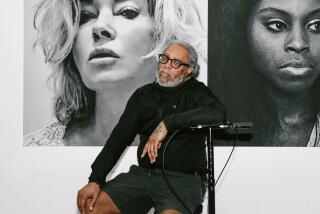HAWKINS--UP FROM THE BOARDWALK
- Share via
One year ago, Ted Hawkins was a busker on the Venice Beach boardwalk, a man literally singing for his supper.
At age 49, with much of his life spent on the road and inside prison walls, he’d accrued lots of experience for the part.
“I looked upon myself as an outcast,” admits Hawkins. “I’d said to myself, ‘Well, this is it. I tried and tried and couldn’t make it. So I’m gonna sit right here and sing until I die.’ ”
Today, Ted Hawkins lives in England, where he is widely regarded as a hero. He’s been the subject of several newspaper and magazine profiles. Critics regularly draw comparisons between Hawkins and his hero, the late Sam Cooke.
“On the Boardwalk at Venice Beach,” an album of the soul and country standards Hawkins crooned each weekend there, has been bobbing in the upper realms of Britain’s independent charts for seven months. Hawkins is currently in the midst of a European concert tour, for which he’ll make more money per show than he used to earn in a week of Venice Sundays.
Hawkins is a spiritual man. But when he says, “It seems like I’ve died and been born again,” he’s not just talking about religion.
Indeed, his story has all the elements of an old-fashioned Hollywood movie--or for that matter, of a Ted Hawkins song.
Its cast of characters includes sadistic prison guards, sleazy record execs, a loyal wife and a boyish manager who helped keep Hawkins’ dreams alive. And it stars a singer whose voice, ranging from a formidable growl to heart-rending falsetto, communicates all the beauty and the ravages of that life.
“I’m just knocked out by the respect I get here,” Hawkins enthused, his gritty baritone a commanding presence even by transatlantic phone.
If his life has suddenly taken on the trappings of a fairy tale, however, the protagonist still has one wish.
“I do hope that America finds me,” he said. “Because until they do, I feel like I’m nothing. I guess I’m still driven in that way. . . .
“But when they find out how many times I’ve been to jail, and how I came up as a child . . . you know, people like colors and what’s pretty. My life has been very ugly.”
He grew up in Lakeshore, Miss., the son, he says, of “a foul-mouthed prostitute” and a father he never knew. “They used to call me Dirty Junior when I was young,” he said. “As far back as I can remember I had to fend for myself.”
Hawkins traces his musical career to a stay at a reform school.
“I heard a song called ‘Peace in the Valley’ by Red Foley, and it made me want to cry,” he said.
“And I enjoyed that feeling. You know, when you listen to a sad song and the tears start to fall--man, that’s when you’re feeling good! I wanted to capture that feeling for myself, so I started to sing.”
His efforts caught the ear of the school superintendent’s wife, who gave Hawkins voice lessons and arranged an appearance for him at a talent show in Jackson.
“I froze behind the curtain,” he recalled. “But she gave me a push. So I walked out and started singing, and I tore the house down. And I’ve been tearing the house down ever since.”
Well, not exactly. At 15, a minor theft earned Hawkins a three-year hitch in the Mississippi State Penitentiary at Parchman. “The man over us was a sadist,” Hawkins recalls, “and he got his sexual gratification by whipping black butts. . . . He was mad at me because I wouldn’t holler, so he almost beat me to death.”
Upon his release, Hawkins began years of aimless wandering. He soon became expert on the relative comforts of skid rows in Philadelphia, New York and Buffalo.
Hawkins never lost his dream about making it as a singer, however, and eventually made it to California. “It seemed like I’d landed in the Garden of Eden,” he said of his arrival in Los Angeles in 1966. Soon after, Hawkins approached Alexander Scott, Sam Cooke’s manager, who advised the would-be singer to write his own material.
“I told him, ‘I can’t write,’ ” Hawkins remembered, “and he said, ‘You don’t know what you can do. Get yourself a recorder and put words to the tune.’ ” Following his advice, Hawkins composed “Baby,” which became a regional hit on the Dolphin Records label.
Elizabeth Hawkins, who’d met her future husband during this period, described it as “an exciting time. I thought this could be his career--he was such a dynamic singer and personality. But we ran into people who gave us a lot of hard times and broken promises. I know that hurt him tremendously. He’s always been very innocent about a lot of things.”
For Hawkins, a sensitive man, such frustrations took their toll. Further attempts to advance his career were interrupted by intermittent jail terms, usually associated with theft charges, and culminated in what he terms a nervous breakdown.
“I don’t remember all the things I did anymore,” Hawkins says, “I just know I wound up screaming and hollering in (the state mental facility at) Vacaville. I guess I must have lost my mind a little bit there.”
But Hawkins also has the soul of a survivor, and he used the solitude of prison to write more songs.
In 1972, blues producer Bruce Bromberg recorded a collection of them, which were eventually released in 1982 as “Watch Your Step” on Rounder Records.
The record has since become a collector’s item and rates a five-star review in the “Rolling Stone Record Guide.” A new Rounder album of Hawkins originals, “Happy Hour”--produced by Robert Cray’s studio team of Bromberg and Dennis Walker--was released last month.
After his release from Vacaville in 1982, Hawkins settled into a niche as a professional street singer. Venice Beach provided a relaxed environment, as well as proximity to the modest duplex in Inglewood he shared with Elizabeth, their son Ted III and several daughters by Elizabeth’s previous marriage.
Enter H. Thorp Minister III, an aspiring young entrepreneur with a few contacts, not much experience and no working capital. “I was amazed at his talent,” Minister said, recalling the first time he spotted Hawkins performing in 1985. “I had the desire and figured, ‘What a great opportunity.’ ”
Hawkins, of course, had heard this tune before. “So many guys had given me their cards, and I never heard from them again,” he noted.
But Minister was different.
From a sympathetic bank officer in his hometown of Columbus, Ohio, he managed to draw $15,000 in loans. He bought Hawkins a new Martin guitar, then arranged a throat operation for Hawkins to get rid of polyps he’d developed. Next he flew the singer to Nashville and produced a recording of “On the Boardwalk,” and the rest of the material for the “ . . . At Venice Beach” album, which he released last fall.
“Bless his heart, I’ll never forget that,” said Hawkins. “Sometimes we don’t get along, you know, but he brought me a long, long ways. I guess you could say I owe him my life.”
“On the Boardwalk” caught the ear of BBC Radio One deejay Andy Kershaw, who flew to Los Angeles and promised to promote Hawkins aggressively if he’d relocate to England. Elizabeth Hawkins wasn’t too excited about the prospect, but to Ted, “It felt like a fresh chance, a new dimension. . . .”
Shortly after his arrival in England, Hawkins toured with folk-rocker Billy Bragg, and followed it up with a solo performance that was videotaped before 1,100 fans at London’s Town and Country club.
“It was almost too much for me,” recalls Hawkins, who was fighting recurring throat problems at the time. “The tension was high. I was scared. . . .”
Hawkins still relishes the excitement of that night: “I never felt anything like it. The people went wild, trying to pull me from the stage. They had these looks in their eyes, and they were yelling, ‘Ted! Ted! Ted!’ I thought, Lord have mercy, this is it.”
Recently, Hawkins assembled a four-piece band for his stage show. When not performing, he spends his days in the village of Bridlington, on the North Sea.
“(It’s) a little town where everybody knows everybody,” he says. “I can ride my bicycle or walk down to the sea, sit by the wharf and hum a little tune--and before you know it I have a song.”
Hawkins has hired an accountant, and speaks optimistically about building security for his family, including real estate investments.
For Hawkins’ family, success poses a dilemma. “We’re very happy for him, and very proud,” said Elizabeth Hawkins, who remains in Inglewood.
“But we miss him and we want him to come back home. It’s very painful. . . . But I’ve loved him for 21 years, so you know that’s some love! So we’ll back him in whatever endeavor he wants.”
After 50 years, Hawkins figures he’s ready to pay the price as well.
“I love Venice Beach from where I sit right now. I still have the milk crate I used to sit on there, and one of these days I’m going to come back there and sit in my spot. But not until America realizes I’m one of theirs. I’d have to be a fool to go back where I’m invisible.”
More to Read
Only good movies
Get the Indie Focus newsletter, Mark Olsen's weekly guide to the world of cinema.
You may occasionally receive promotional content from the Los Angeles Times.










